- Home
- Jack Hamlyn
Necrophobia #3 Page 22
Necrophobia #3 Read online
Page 22
“Paul,” I said, kissing her back. “Is Paul okay?”
“He’s fine, man,” Diane said. “He’s back at the Silo.”
“The what?”
“We’ll explain later,” Tuck said, as we moved down towards the fire.
It was a very emotional homecoming. It was so wonderful that I honestly forgot all about what I had seen back there. Questions were fired and we all talked at the same time and probably made no sense at all.
When we calmed a bit, Robin said, “Who’s the chick?”
Introductions were made. I had always envisioned introducing Robin to Sabelia because they had similar backgrounds and I knew they could be friends. I just couldn’t believe that it had actually happened. As corny and cliché as it sounds, it felt like a weight was lifted off of me as if I had been carrying a load of bricks on my back for weeks and weeks and I suppose that, figuratively, I had been. My heart had wings at that moment and it wanted to fly.
“Damn, Booky, good timing!” Tuck said, slapping me continually on the shoulder. “We were just about to break camp! Damn, ten minutes and you would have missed us!”
The armored vehicles weren’t Strykers, they were Guardians.
“Yours?”
He nodded.
He explained quickly that they had been clearing zombies in Perryville most of the day. It had been my friends we heard shooting up the place. Jesus. We had been that close all the time. That close. And also, that close to missing them.
He told me that there had been a third Guardian that was ripped apart by the chain gun on a LAV-25 the day before. I wondered if it was Spider. The crew had consisted of three people I did not know—Johnny, Chuck, and Reese—and a woman that I did, Dorothy. That saddened me. I liked Dorothy. She was a country girl and a crack shot. I would miss her. Chuck, I was told, was an Iraq vet like me. I would have liked to have met him.
“Where’d you pick up these rigs?”
Tuck said, “We liberated them from ARM along with a whole lot of ordinance. I think they’re still pissed off about that one.”
ARM had nowhere near the strength up in the ‘kills that they had down in NYC or Buffalo, he told me, but there were still enough of them. Mostly they were scavenging and raiding, searching for weapons, food, and people to be drafted. Tuck and his raiders were hitting them every chance they got, employing the same strategy the Viet Cong had used against US forces in Vietnam: hit ‘em and fade away. Kill as many as you could, destroy as much equipment and infrastructure as possible and then go to ground. The classic guerilla offensive. The same one, essentially, the terrorists in Iraq had used against us. Militarily, it was little more than a mosquito bite in the larger scheme of things, but the psychological effect on ARM troopers could not be overstated. Tuck knew he never had a chance against them in a fair fight, but if he harassed them enough, he would beat them in spirit until they pulled out of the ‘kills, deciding it wasn’t worth the trouble.
I wondered what he’d say when I told him about PHOBIC and the Bloodlords.
“We got movement out there,” Diane said.
Tuck put on a pair of NVGs and scanned the fields. “Mutants,” he said. “Let’s go! Everyone load up!”
I could hear sounds out in the darkness, scurrying, scrambling sounds. Sabelia, Tuck, Diane, Robin, Sandy, and I climbed through the side hatch of one of the Guardians. The mutants were raiders attracted by the fire. We had to get out before the chemical weapons started flying.
“ROLL IT OUT! ROLL IT OUT!” Tuck cried.
Diane took the wheel, and Carrie, who’d been driving, gave me a quick hug, and climbed up into the basket, which was in the turret above where the remote weapons station was located. We roared on down the road behind the other Guardian. Carrie swung the turret around and directed fire at what was behind us. She called down that there were dozens of them running after us. I could hear the skin-crawling whirring sounds they made. She sighted them in with the night scope and opened up with the 40mm grenade machine gun. There were explosions behind us.
So much for the mutants.
“Where are we headed exactly?” I asked.
“Up the mountain to the Silo,” Sabelia said.
She was holding tightly to me and I had the feeling that Robin did not like it much. She felt threatened by my friends and particularly by Sabelia. I had to wonder if she had secretly hoped we’d never find them at all. She lit a cigarette and Tuck told her there was ordinance on-board, no smoking.
“Fuck that,” she said.
“You either put it out or you go out,” he told her.
“So pull over already. I’ll get out any time. You think I care? Well, guess again.”
She was in one of her moods, but so was Tuck. I gave him a look and he mellowed. He understood my looks and he knew this kid had to be handled with care. He backed off, for which I was grateful. Something he was not very good at.
“I just want to be safe,” Sandy said. “All I want to be is safe and sleep in a bed.”
Tuck sighed. I could sense the pity he felt for her. “You will, honey. Trust me on that.”
“Sure,” Diane said. “It’s cool. We’ll get up to the silo. Hot food. A shower. A bed. You’ll be doing good.”
I couldn’t wait to see this Silo complex they were telling me about. It sounded incredible. The sort of high-tech joint that would put Tuck’s long-gone tower to shame. It was a converted Atlas missile base. A very high-tech, high-comfort survival shelter. The whole thing belonged to a guy named Roman Chandliss. I had heard of him, of course. He had been a billionaire investor before The Awakening.
Sabelia told me what had happened since they’d seen me last. After I got separated from Tuck and the others in the Bronx, they waited for me and searched for me and finally gave up. They went up to the Catskills, as I knew they would, to seek out the farm of Bobby Hughes. He and most of his people were dead from Necrophage, but a few were still alive so Tuck and everyone joined them. It went good for awhile until ARM showed up. There was one battle after another (which explained the destroyed Stryker vehicle I had seen) and eventually, they abandoned the farm and moved up higher into the mountains which was where they came upon one of the Silo’s patrols and hooked up with them. It was quite a tale and the Silo sounded like some kind of place. There were twenty other people up there I had never met. Good, honest, caring people, Sabelia told me. I was looking forward to it.
“Tell me about Paul,” I said
Diane said, “It was pretty bad all around, Steve. When we came back without you that day, he pretty much went into hysterics. He was certain you were dead, that he’d never see you again. It was bad for quite some time. He wasn’t too happy about us pulling out for the Catkills, man, I’ll tell you that much. For weeks, I held onto him or he wouldn’t sleep. He’ll be awful glad to see you.”
And I would be awful glad to see him.
Maybe that’s why I had attached myself to Robin. She wasn’t a stand-in for my son exactly, but at the same time in her I saw what Paul would become with the loss of both parents: an angry, disenfranchised kid. I wasn’t about to let that happen to him. And I honestly thought I could draw Robin out of the darkness of her pain given time. Maybe that was wishful thinking.
Though it was dim inside the Guardian now that we were moving, I could still see Robin across from me. Her eyes never left me. She was staring at me. Every time she pulled off her cigarette, her face lit up orange and her blue eyes blazed like crystals.
Diane brought over an Icom radio so I could talk to the other Guardian. Jimmy LaRue was driving it. It was good to hear his voice again. Jimmy had lived across the street from us in Yonkers and had been a good friend to us for many years. We chatted for a bit and he told me more about the Silo, the fresh vegetables and fruits they were growing there, the chickens, hogs, and cattle that supplied fresh meat and milk. It sounded amazing. Like an oasis.
I chatted more with Sabelia. She knew quite a bit about the mutants. They were created by
the bioengineered grave mold as I thought. Instead of attacking the dead, it infected the living. And it was spreading. When the mutants spored, they spread their seed.
“How did you learn all that?” I asked her.
“Doc Nace,” she said. “You’ll meet him. He worked for the CDC in Manhattan. He knows his stuff.”
It appeared as if Roman Chandliss had thought of just about everything. I wasn’t surprised. Guys like him always do, that’s why they’re so successful. People like me wander through their lives like rats in a maze, smelling the cheese and driving themselves crazy trying to find it. Guys like Chandliss know exactly where it is and how to get it. That’s the sad truth of life. Even now that the world had gone toes up, he was still on top of his game and guys like me were still running in circles.
We kept driving. The Guardians could do maybe sixty miles-an-hour wide open, but on this winding country road, that just wasn’t a good idea. We were averaging about thirty, slower on the turns, up to forty on the straight stretches, but there weren’t many of those. I think we all sighed with relief when we turned onto the highway and started pushing it faster.
We cut down the highway with our lights off, steering by thin moonlight. There was no sense attracting attention. It was going pretty well. Sabelia, Diane, and I were chatting it up, joking around about a few things. We didn’t discuss Dorothy and the others that died in the other Guardian. There would be time later for mourning.
All I knew is that I was with my friends again and that soon I would be seeing my son. That’s all that really mattered. I had gotten myself back to them in one piece and I had gotten Robin and Sandy back, too. That was something. That was an achievement. I was proud of it.
I didn’t know what was ahead, but as I held Sabelia, it was more than enough for now.
—The End—
[email protected]
Read on for a free sample of The Ghoul Archipelago
1. JIM
Jim had never been so eager to burn a person before.
“Shall I fire the body?”
He stood, torch in hand, waiting on the riverboat captain’s decision. They had tied the boat off a few hundred meters upstream, just past the tributary that led west, into Patusan’s jungle primeval. The boat’s captain, Charles Marlow, crouched over the bloated corpse of the islander they had noted from the boat, and stopped in order to examine.
“Hmm?” was all Jim got by way of a reply.
Perhaps taking liberties (but, then again, perhaps not), Jim put his hand on Marlow’s shoulder and tried to press him to stand.
“Captain Charles, you not lean so close,” Jim said, “there dysentery and malaria to contend with. And worse things. Bodies not for such close examining. For burning.”
Sighing heavily, Marlow stood, brushing Jim’s hand off his shoulder as though it were a mosquito or a speck of bird shit.
“It’s really not the disease which worries me, Jim,” Marlow breathed, “take a gander over yonder.”
Jim followed the invisible line of Marlow’s finger to the corpse’s neck. Jim had never been one to be queasy, but neither was he overly fond of the mutilated dead. He had up until now not closely examined the body, certainly not as closely as Marlow had been examining it, for what seemed like an eternity now.
The woman had at some point tripped and put her eye out on a low, sharp tree branch. She laid there, still, torso and legs flat, but head and shoulders propped up a few dozen centimeters off the ground. Jim had seen no cause to look for further means of death. Marlow had, and so it seemed, as usual, the captain was right.
The islander’s neck was unusual in that it was little more than exposed bloody meat. Thorns lay embedded in odd places throughout, and most of the skin had been stripped off.
“She got her throat caught in the underbrush,” Jim said, “and then a vine ripped a chunk of it away.”
Marlow had already wandered off as Jim was speaking. Hurrying, but not so fast that his torch would extinguish, Jim went after his boss. The Englishman seemed to be looking for something.
“I say, do tell me, Jim, if you were to get caught on a thorn right now, do you think that you would continue walking?”
“No,” Jim said, “I extricate it. Sloooowly.”
Jim dragged the last word out to three and a half syllables to indicate exactly how slowly he meant. Marlow nodded.
“You certainly wouldn’t keep walking until it ripped a chunk of your arm out,” Marlow said, “or, God forbid, your throat.”
Although he didn’t need to, Jim shook his head. Marlow whirled on the man, clearly eager to make his point. He reached up and scarcely glancing at it, plucked a chunk of pink, maggoty flesh from a tanglevine.
“And supposing you did all this, that, and the rest,” he said, “would you then proceed to walk a few yards more, until you…”
Marlow slammed his fist into his other palm, to indicate, presumably, impaling one’s eye on a tree branch. The poor dead woman’s neck flopped in his hand as he did so, splitting nearly in half. Seeming to notice the gruesome bit of viscera for the first time, Marlow let the throat skin slip from his fingers to the ground, and rubbed his hands together to get the bugs and bits of grime and blood off.
“I saw dog once,” Jim said, “a mangy animal, yellow, with big spots rubbed out of his fur, walking through the streets of Manila with foam on his mouth. I not think to notice such an animal, but he, ah, walked along the cobblestones with his ear to the ground. The whole left side of his face rubbed off, all just muscles and protruding bone, and a sightless eye rotating in its socket.”
“Rabies,” Marlow guessed.
Jim nodded. A twig snapped behind his head and Marlow’s hand went instinctively to his hip. He slowly, but forcibly, undid the button on his brown leather holster.
“I dislike these woods,” Marlow said. “If I didn’t know any better, and I was a bit of a superstitious man, I might swear we were being watched.”
Jim nodded.
“There no settlements here,” the Filipino said. “The jungle said haunted in these parts. No one comes here.”
“She came here,” Marlow said, cocking his head towards the corpse, “so that’s quite evidently not the case. Unless you should think she’s a specter and not a real corpse, eh?”
Jim held his tongue this time. He had already made his point about the rabid dog. Far sadder was the tale of a person afflicted by some disease that wasted away the mind. Jim had always been taught to respect his elders, but he had seen far too many whose brains had turned to goat cheese, who began calling him “Bill” or not recognizing him at all.
“Let’s make our way back to the boat, shall we?” Marlow said, not taking his eyes off the wood line behind Jim.
No doubt it was his imagination, but Jim was sure there were shadows all around, watching them. He proffered the torch to the riverboat captain again.
“What about the corpse?” Jim asked.
Marlow eyed it with rather visible distaste.
“Yes. Well. Leave it for the gulls, I should think,” Marlow said. “As it so happens, I’m worried about my own corpse right this very instant.”
Without turning around or drawing his pistol, Marlow walked backwards towards the boat. Jim joined him, almost reflexively turning his back in the same direction that Marlow had his. He thought better of it, though; figuring at least one of them should be looking in the direction they were actually travelling. He put another libertine hand on Marlow’s shoulder and led the suspicious white man all the way back to the boat, his torch the only pinprick of light in the dark.
Jim refused to breathe again until the boat was motoring down the river and the dead woman was out of sight.
“I thought I might have heard it said somewhere that it was not the custom to bury the dead on Patusan,” Marlow said, once the cool night air and thin spray of river mist had calmed their nerves.
“No,” Jim agreed, “but neither is it to leave the dead for the birds.
Now, in Persia, I hear it done…”
“So, it’s cremation that’s the custom here, then,” Marlow concluded, cutting him off. “That might go some way towards explaining why you were so eager with that firebrand.”
Jim nodded, and almost as an afterthought, tossed the torch into the water. It sizzled where the oily end struck the water, and sank with a thunk even before the boat was out of earshot. Marlow’s eyes were twinkling with a sort of perverse glee.
“I say, Jim,” he said, lowering his voice for no particular reason, “is it true what they say? That the locals in this island chain also burn the sick before they die?”
Jim cast his eyes down on the water.
When he lifted them again, he said, “True that they say that.”
“Might be that the locals have convinced themselves that it may just be safer that way,” Marlow mused. “In order to ward off the spread of malaria and the like.”
“And the like,” Jim agreed.
It was almost midnight before they came upon the burned-out skeleton of the old wooden mission. Marlow slowed the boat to a crawl and kicked Jim until he woke. It was his first trip downriver, but it was not Jim’s, so Jim was serving as a guide of sorts.
“Jim, old boy, gather your wits about you. What is that?” the white man asked.
Bleary, rubbing the oh-so-precious little bit of sleep out of his eyes, but not betraying his tiredness in his voice, Jim replied, “That the old Christian mission. Pastor Coughlin abandoned it six months ago when it burnt down.”
“During a funeral service, no doubt,” Marlow said.
Jim shook his head.
“I don’t think so,” he said, “the Bugis claim it was the Malays, and the Malays claim it was the Bugis. But all agree it was arson. Only one was killed: a woman.”
“Was she a missionary?”
Jim nodded.
“Sad. They said she beautiful.”
“Well, where is the preacher now? Not dead as well, I trust?”
“He moved on to Hippo.”
Marlow snorted.

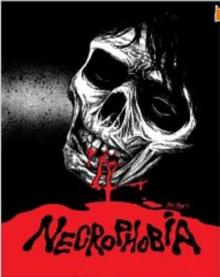 Necrophobia - 01
Necrophobia - 01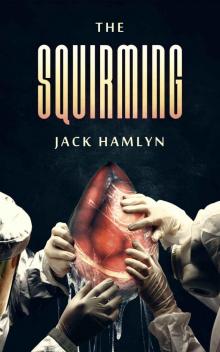 The Squirming
The Squirming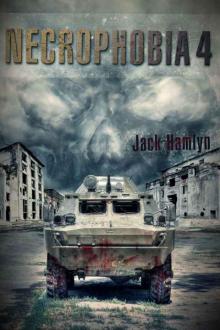 Necrophobia 4
Necrophobia 4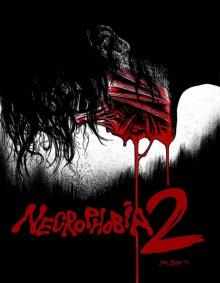 Necrophobia - 02
Necrophobia - 02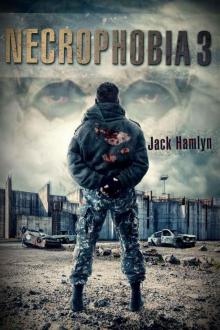 Necrophobia #3
Necrophobia #3